Gregg Araki’s ‘Teen Apocalypse’ trilogy, as timely as ever, and the week’s best films
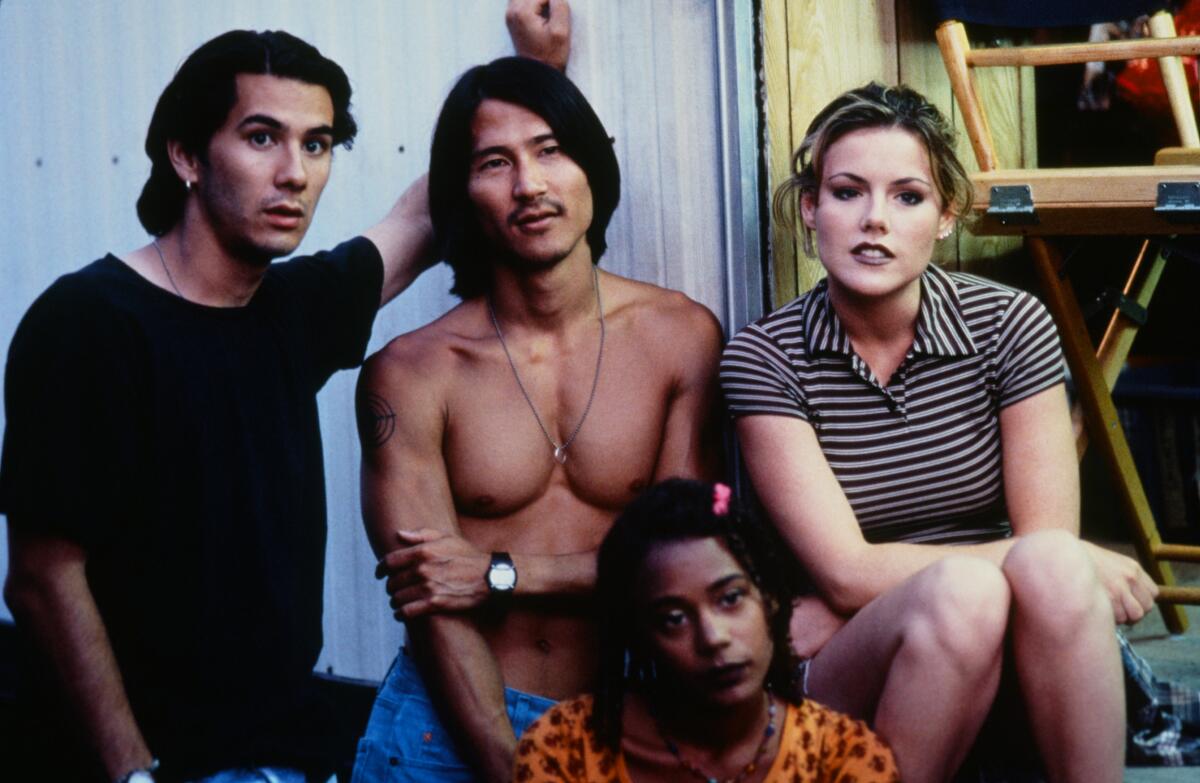
- Share via
Hello! I’m Mark Olsen. Welcome to another edition of your regular field guide to a world of Only Good Movies.
TIFF wraps up We were busy this week at the Toronto International Film Festival. Since there were many films directed by actors, Matt Brennan, Jen Yamato and I undertook the task of seeing them all and ranking them. (The winner was Anna Kendrick’s directing debut, “Woman of the Hour.”)
Jen also spoke to filmmakers Caroline Suh and Cara Mones about their documentary “Sorry/Not Sorry,” which looks at the allegations of sexual misconduct around comedian Louis C.K. and whether he suffered any significant consequences from them, particularly in relation to the fates that befell his accusers.
As Mones said, “I do think that progress around the conversations that #MeToo started is still here, and I think that there’s something to be said about that. So I think that is a question of, as we continue to hear these stories, where are we putting the attention? Does it continue to be on the accused or will we see more of a shift of attention to the people who are coming forward and speaking out? That’s what I’m interested to see.”
Matt led a conversation with George C. Wolfe, director of “Rustin,” a portrait of civil rights activist Bayard Rustin. As Wolfe said, “I really firmly believe that when you work on a project, it takes a piece of your life that you will never get back. And so by the time you finish, you went, ‘Thank God that’s done.’ But there’s this really weird dynamic that’s happening with Rustin. It’s like the more time I spend with him, and the more time I’m not actively shooting or editing, the depth of my appreciation for him as a human being, for the potency of who he was and what he accomplished, keeps growing and growing and growing. Activism is not a noun. Activism is a verb. It’s what you do.”
I attended the world premiere of the new IMAX 4K restoration of Jonathan Demme’s 1984 concert film “Stop Making Sense.” All four members of Talking Heads were there, appearing together for the first time in 21 years for a Q&A moderated by Spike Lee. As band member Jerry Harrison said, “One of the reasons for the lasting power of the film is you can see how much fun we are having onstage.”
Also in Toronto, Harmony Korine presented the thermal-image hallucination of “Aggro Dr1ft,” a story of a Miami hit man given extensive post-production visual effects treatment. In a conversation about his new multimedia company, EDGLRD, Korine talked about AI and what he is attempting to create with this bold new work.
“It’s like a looping glitch world — it’s caught between reality and something hyper real,” Korine said. “That’s why we’re using the thermal imagery. I liked the idea of something being heat-based, of it kind of attaching itself to the soul of the character. And so it really then becomes about the silhouettes, the colors, the heat, the life. And there is something kind of beautiful about that experience. It is an attempt to show a kind of post-articulation: what comes beyond just a simple articulation and an explanation of the narrative.”
In our TIFF studio, photographer Jay Clendenin snapped shots of the likes of Ethan Hawke and Maya Hawke, Elliott Page, Vicky Krieps and Viggo Mortensen, Coleman Domingo, Pedro Almodovar, Roger Ross Williams, Finn Wolfhard, Alexander Payne, Hirokazu Kore-eda, Lulu Wang and Nicolas Cage.
Gregg Araki’s ‘Nowhere’
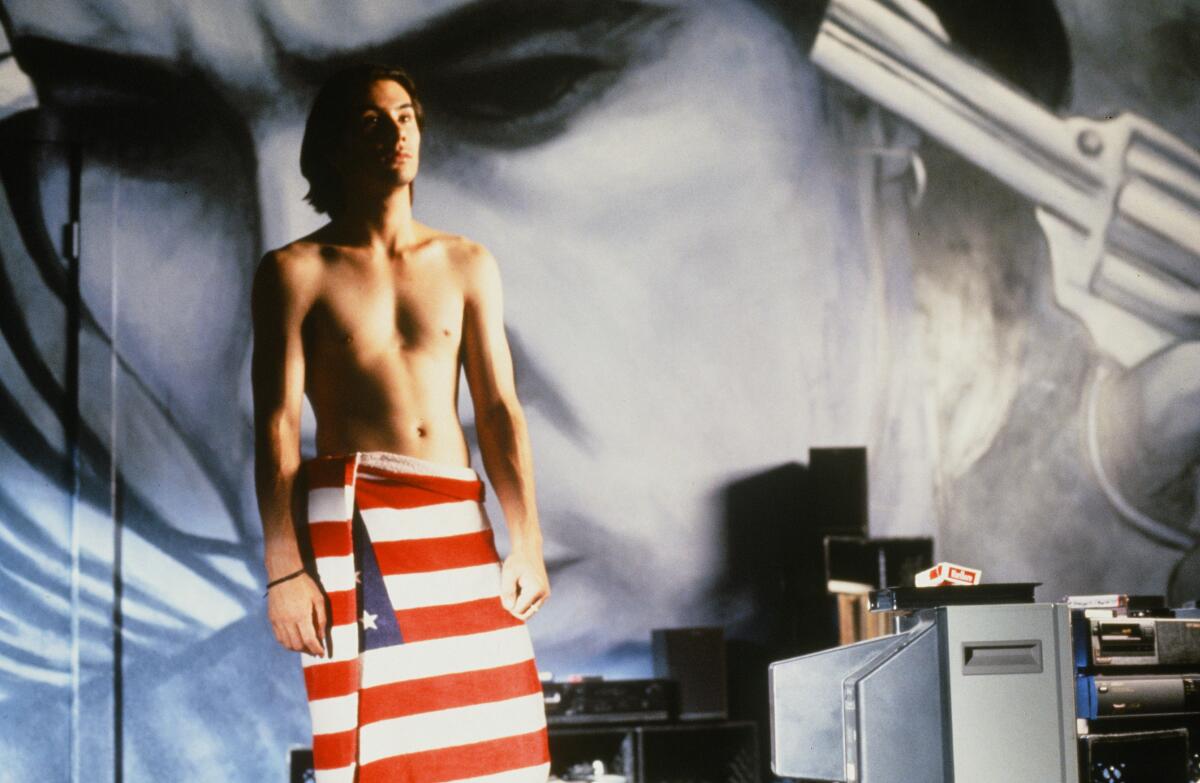
The world premiere of a new 4K restoration of the 1997 film “Nowhere” will be the highlight of this weekend’s presentation of Gregg Araki’s “Teen Apocalypse” trilogy at the Academy Museum.
Friday night will see 1993’s “Totally F***ed Up” screen along with 1995’s “The Doom Generation” and a conversation between Araki and filmmaker Gus Van Sant. Saturday will feature the screening of “Nowhere” plus Araki in conversation with “Fire Island” director Andrew Ahn.
Araki emerged as part of the “New Queer Cinema” of the 1990s alongside Van Sant, Todd Haynes, Tom Kalin and others. Araki’s films had a punkier sensibility than many of his peers’, featuring boldly stylized images, plugged-in pop culture references and cameo appearances and soundtracks stuffed with current artists such as Hole, Portishead, Cocteau Twins and Lush. And his movies have recently found a whole new audience among the very-online Letterboxd generation of movie fans.
“I can’t be more honored or thrilled,” Araki, an ebulliently youthful 63, said during a recent phone interview. “As a filmmaker, I’m not really Oscar bait. I’m never going to win an Oscar. But when people come up to me and say, ‘Oh, this movie really means a lot to me,’ or, ‘This movie changed my life,’ particularly it tends to be younger people or people who saw them when they were young. As a filmmaker, it’s all I could ever have dreamed of or asked for, because I’m just an artist just doing my own thing, making my own little movies that are really personal and they really mean a lot to me.
Araki recalls the moment of his breakthrough vividly. “When ‘Doom’ premiered at Sundance, we were unique and unlike anything else that came out in the ’90s,” he said. “And they’re still that way today. There’s no movie that’s like seeing ‘Nowhere’ again. There’s nothing out there like it. It’s still so unique and so one-of-a-kind and I think that’s really what the young people respond to.”
In “Nowhere,” James Duvall (who appears in all three “Teen Apocalypse” films) plays Dark, who is in an open relationship with Mel (Rachel True), herself seeing a woman called Lucifer (Kathleen Robertson). As they try to figure out their priorities, the characters encounter surprising situations, up to and including space aliens.
A restoration of “The Doom Generation,” which features a definitive ’90s cool-girl performance by Rose McGowan, premiered earlier this year at the Sundance Film Festival. Araki has never been satisfied with the versions of “Doom Generation” and “Nowhere” that have circulated up to now. The latter was never even released on DVD in the U.S., only getting released during the era of VHS. Strand Releasing is behind the restorations of all three films.
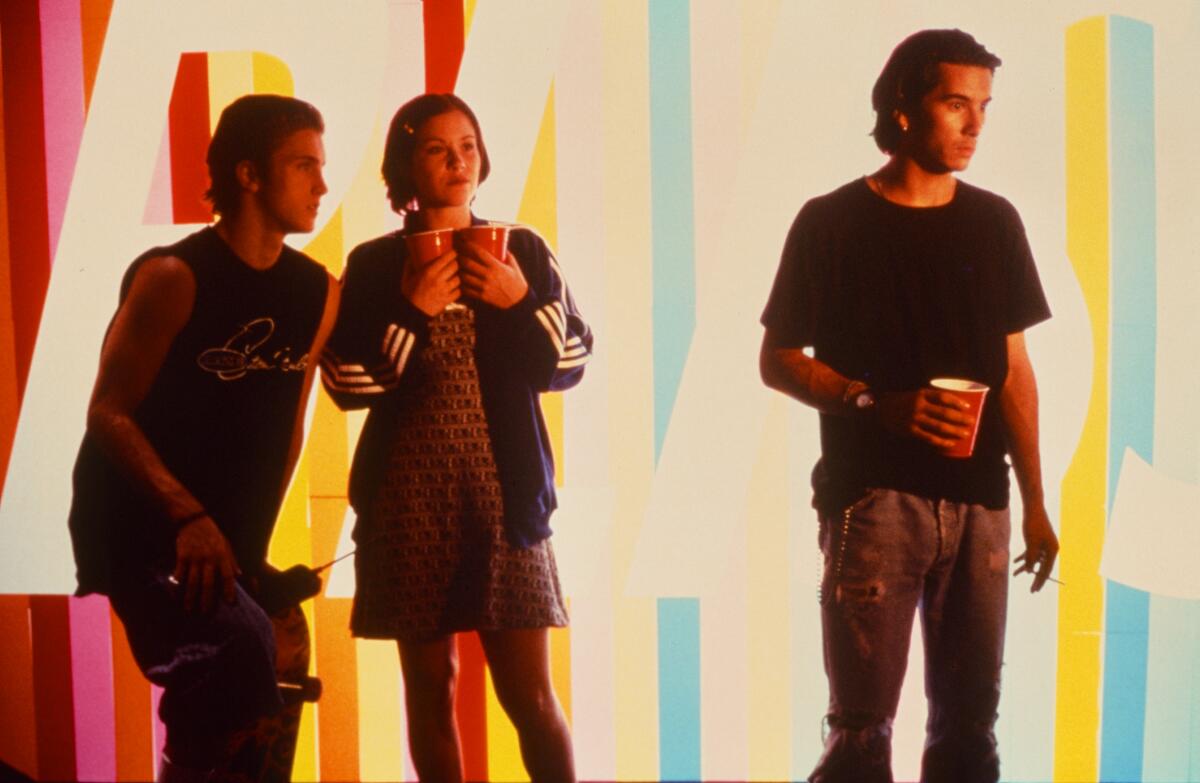
Araki said he always intended for his lovers-on-the-run tale “The Doom Generation” to be as transgressive as possible, referring to a desire to make “‘Last Tango in Paris’ for teenagers.” And “Nowhere” was purposefully made for an even younger audience, with no real nudity and invented slang instead of conventional curse words.
“I wanted to have that sensibility, but make it in a way that’s sort of like a wolf in sheep’s clothing,” said Araki. “I wanted to do a PG-13 version of ‘Doom Generation’ for kids who are 15, 16 years olds, when you’re that age that you’re looking for something kind of not ‘same old thing,’ something a little more adventurous or risky. I wanted those kids to be able to see a movie when maybe they’re a little too young still for ’Doom Generation.’”
Araki ran into issues over the rating for “Nowhere” and had to truncate scenes with characters played by Ryan Phillippe and Heather Graham, material that has been added back into the restoration.
“It just basically took the edge off,” said Araki. “I mean, there’s still obviously a lot of edge left in ‘Nowhere’ with what was released, but I was so overjoyed to restore this stuff because it’s some of my favorite moments of the movie, and I’m so glad that they’re back for posterity. It’s ‘Nowhere’ as it was always intended to be seen. So it’s very gratifying.”
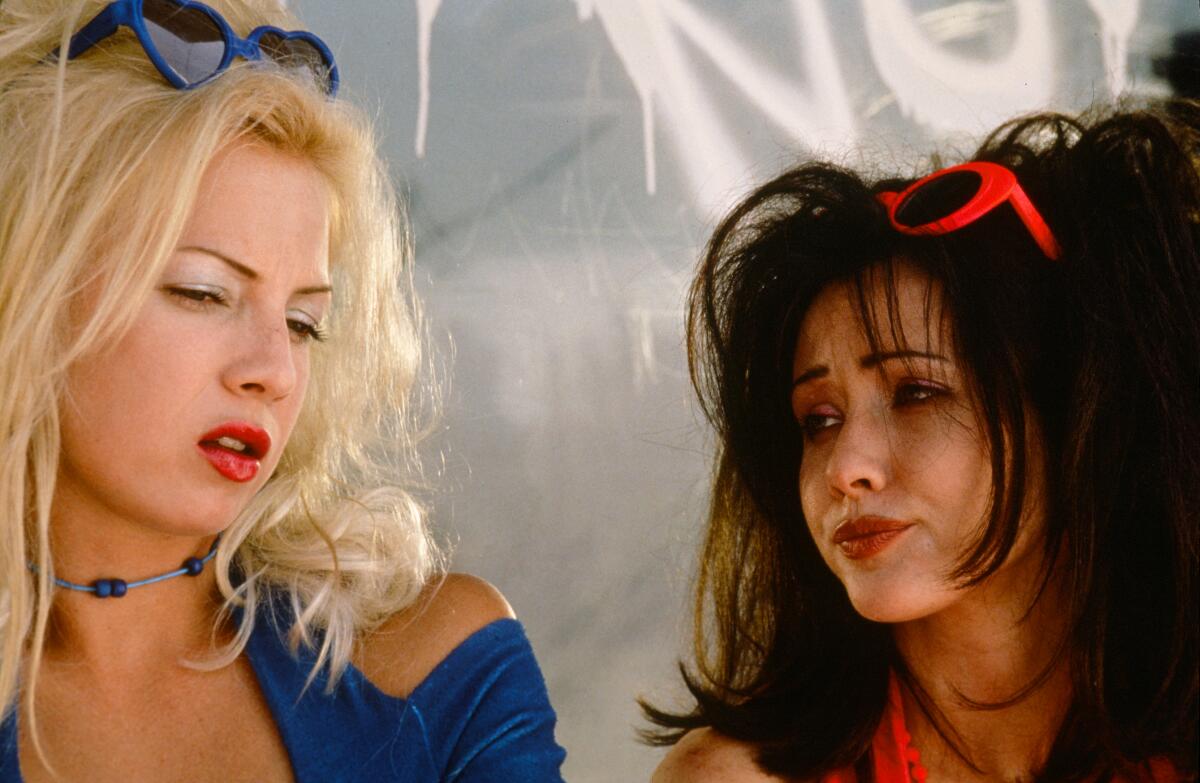
Part of what younger audiences are certainly responding in Araki’s work is the liberated, fluid sexuality, which seemed radical at the time but feels completely in tune with the identity and sensibilities of a contemporary generation.
“My movies have a lot of sex and sexuality in them because for me, particularly as an artist, sex and sexuality are such an important part of identity and character and who you are,” said Araki. “Those experiences are what forge you and make you. If I was not queer-slash-bi-slash-whatever-I-am, if I had not had all the experiences I’ve had, including one-night stands and weird things that have happened to me, I wouldn’t be the person I am today.
“And I do think that the tide has shifted in two ways” added Araki. “One is that so many young people are nonbinary or exploring so much about sexual fluidity and what’s male, what’s female, what’s gay, what’s straight, what’s bi. It’s shifting and evolving. I think that’s incredibly exciting. But I do think at the same time, a lot of younger people, they’re afraid to have sex. Young kids are not having as much sex as they used to. And I just think that is such an important part of growing up and figuring out who you are. And so I’m hoping that ‘Nowhere’ will help inspire some change there.”
“The Doom Generation” and “Totally F***ed Up” have been streaming on the Criterion Channel. Araki says “Nowhere” should be available there at some point as well. The new restorations are also coming to Blu-ray.
Araki specifically requested that this weekend’s screenings at the Academy Museum take place in the larger, louder David Geffen Theater.
“Seeing ‘Nowhere’ and ‘Doom Generation’ on that f— screen, it’s a once in a lifetime experience,” the filmmaker said. “They’ll never look like that ever again. I’m so amped for those screenings, I can’t wait. It brings tears in my eyes to see. It just looks amazing now. And I shouldn’t say this — maybe I should — but there’ll be some special guests. It’s going to be a party.”
Arturo Ripstein
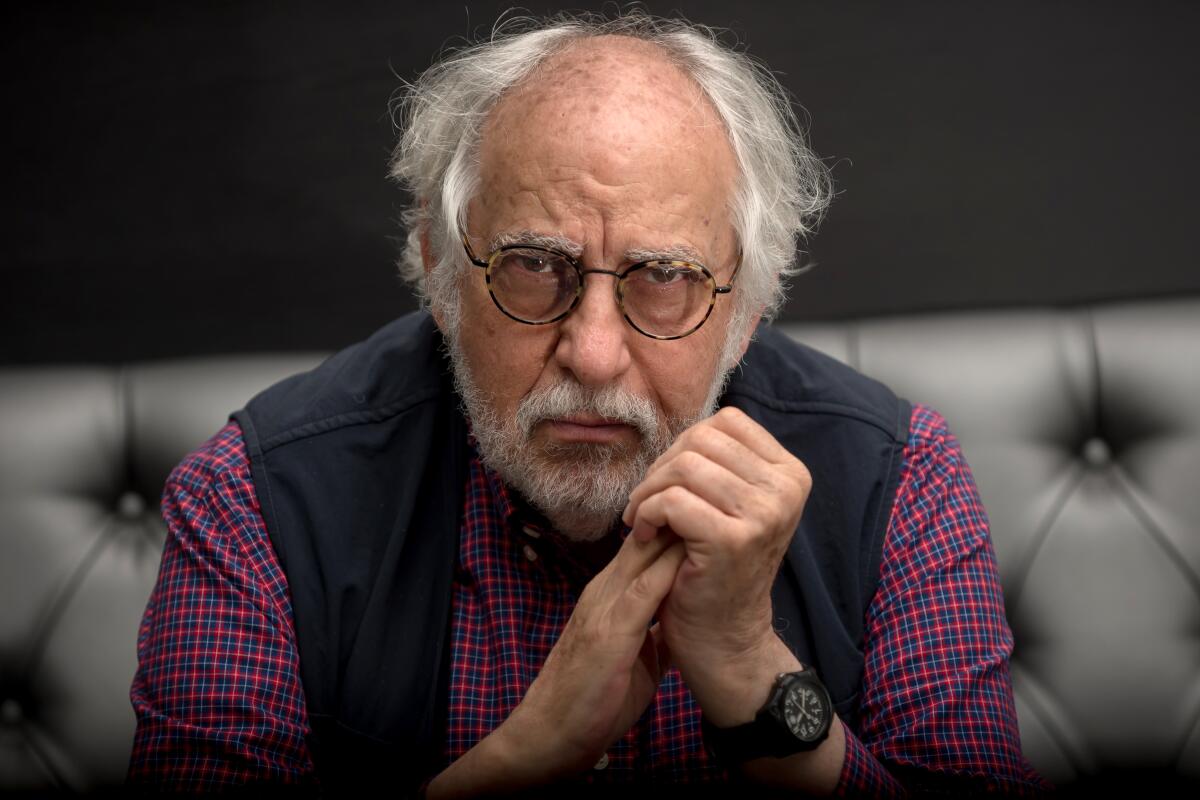
The American Cinematheque has launched a tribute to Mexican filmmaker Arturo Ripstein, with the filmmaker in person along with his wife and collaborator Paz Alicia Garciadiego. The highlight of the series will be the U.S. premiere of the new director’s cut and 4K restoration of the 1996 film “Deep Crimson.”
Carlos Aguilar spoke to Ripstein, 79, about how he looks at his career now. As Ripstein said, “I wanted to be Fellini or Kurosawa or Fritz Lang, but it didn’t happen. Luck chose for me to be Arturo Ripstein and I have resigned myself to being him all these years.”
Ripstein’s influence as a filmmaker in Mexico is evidenced by the fact that Oscar winners Alfonso Cuarón, Alejandro González Iñárritu and Guillermo del Toro all spoke for Aguilar’s article.
As González Iñárritu said, “His voice and vision of Mexicanness is persistent, unique and unmistakable.” Cuarón added, “He’s fundamental in the history of Mexican cinema. A master and a role model for all of us who came after. We owe him so much.”
Billy Woodbury
On Monday the REDCAT Theater will screen four short films by Billy Woodbury, a vital member of the L.A. Rebellion movement, with the filmmaker in attendance. Among the films screening will be the 1978 film “The Pocketbook,” adapted from a story by Langston Hughes, and 2016’s “Marseille après la guerre,” a tribute to filmmaker Ousmane Sembène. As guests enter and exit the theater, Woodbury’s 2004 film, “The Architect, the Ants and the Bees,” about the construction of the Wall Disney Concert Hall (the building REDCAT is nestled inside of) will be playing on monitors in the lobby.
Only good movies
Get the Indie Focus newsletter, Mark Olsen's weekly guide to the world of cinema.
You may occasionally receive promotional content from the Los Angeles Times.




